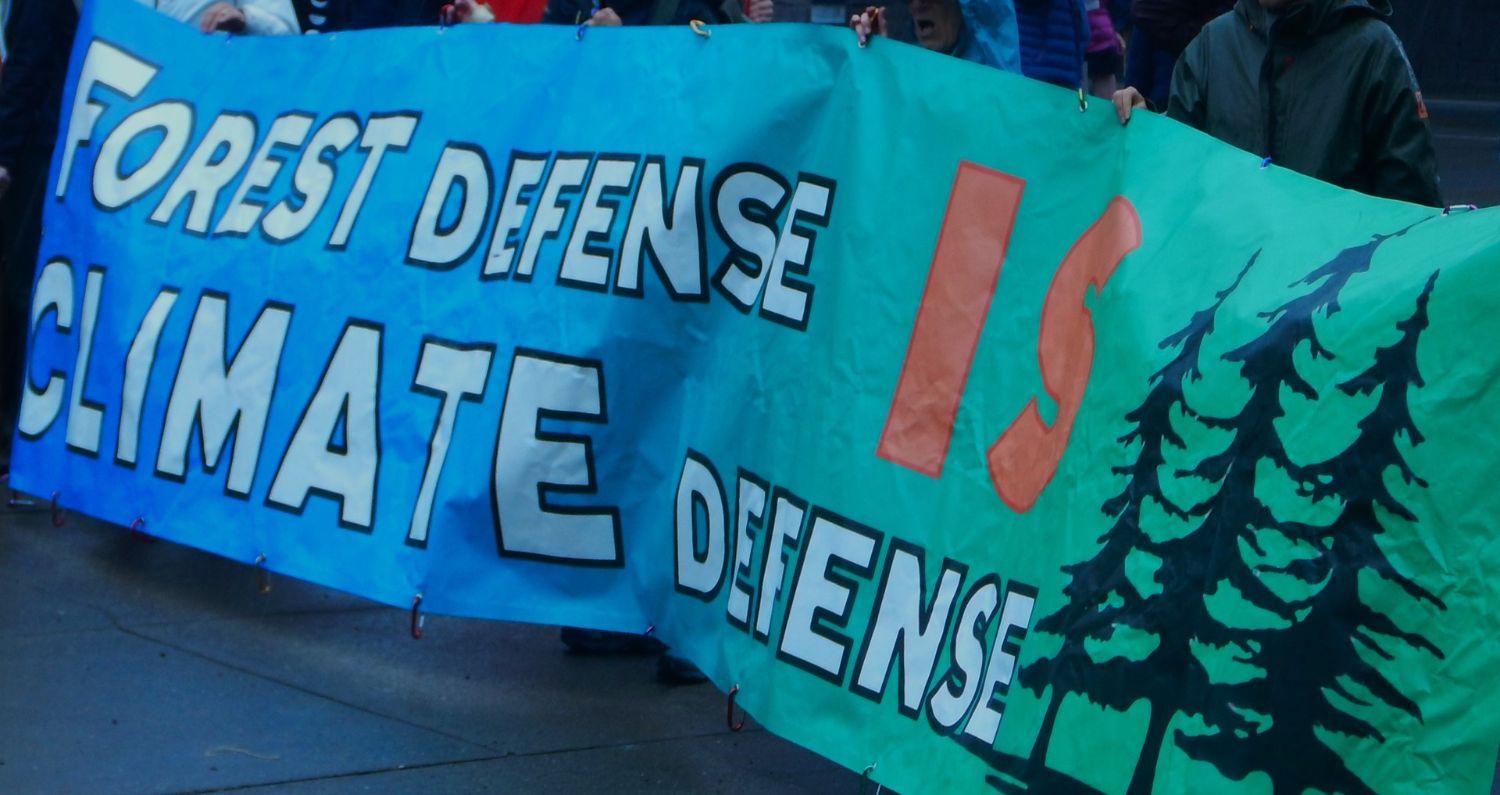
Long time volunteer and community activist Lloyd Vivola has written a fantastic summary of the Forest Over Profits rally and conference which occurred 9/27 and 9/28. We hope you enjoy his lovely writing and the many links provided.
——————————————————————————————————————
Forests Over Profits!
Indigenous Activists and Resiliency Advocates
Speak Out Against “Wall Street” Forestry
On Wednesday, September 27, indigenous and non-indigenous activists convened on the traditional homelands of the Multnomah, Clackamas, Chinookan and Kalapuya peoples to speak out against the annual “Who Will Own the Forest” conference being held at Portland, Oregon’s World Forest Center.
The WWOTF is a two and a half-day conference led by industrial forestry companies, timberland investment firms, and associated corporate interests whose goal is to further finance industrial forest production under banners of renewable energy and green solutions to climate crisis.
The protest rally and alternative conference were organized by Forests Over Profits.
Participating FOP activists from the Indigenous Environmental Network, each of whom attended the WWOTF as paying guests, would later confirm that proceedings inside the industry-sponsored event were big on market solutions and technological fixes while ignoring the ample body of evidence that confirms the damaging impact that industrial forestry has on climate, biodiversity and human communities.
According to FOP observers, the WWOTF was promoting the burning of biomass in spite of medical research that cites its unhealthy levels of CO2 and particulate emissions when used to fuel electricity production. https://www.lung.org/blog/dangers-wildfire-known-biomass
According to FOP observers, the WWOTF continued to frame carbon-offsets as a viable, “green”, carbon-reduction strategy in spite of recent research concluding that most carbon-credit portfolios were “junk” when it comes to cutting carbon-emissions. https://www.theguardian.com/environment/2023/sep/19/do-carbon-credit-reduce-emissions-greenhouse-gases
According to FOP observers, human rights and indigenous sovereignty were not being addressed inside the WWOTF conference.
One WWOTF speaker reportedly patronized Forests Over Profits protesters by saying that those attending the rally “love the forest” just like industry insiders do.
Nevertheless, the presence of the FOP rally, held just beyond the gates of the World Forest Center, forced the WWOTF to relocate its sit-down lunch.
While the Forests Over Profits rally was punctuated by chants, street theater, and native songs performed by Wanapum elder Anna Mae Leonard and younger indigenous singers, the gist of the gathering was grounded and information-driven as indigenous speakers and forest resiliency advocates addressed some 200 supporters and onlookers.
Current and future initiatives to counter industry-biased science and ”sustainable” economics were front and center.
A red flag alert was raised regarding the plans of Drax to open a wood-pellet production facility in southwest Washington State, an area with already compromised air quality. Subsidized to the tune of $750 million a year by the British government and often cited for logging old-growth and violating the American Clean Air Act, critics estimate that the proposed Drax facility would be felling and processing unsustainable volumes of Pacific Northwest forest, then exporting product to Great Britain for burning. https://www.nbcnews.com/science/environment/mississippi-community-takes-uk-energy-giant-pollution-concerns-rcna97385
On Thursday, as the industry-sponsored WWOTF was wrapping up, the Forest Over Profits rally shape-shifted into a day-long, sit-down counter-Conference held at Portland’s First Unitarian Church, with the program featuring indigenous and rural forestry activists.
Brenna Two Bears and Thomas Joseph of the Indigenous Environmental Network spoke of the Land Back movement, emphasizing how it was much more than a mere transfer of property, being instead a full-scale ecological shift toward indigenous science and wisdom as practiced while living in place sustainably over centuries.
Brenna highlighted the role that she and colleagues played in the California State Legislature’s recent endorsement of the Fossil Fuel Non-Proliferation Treaty. Thomas paid tribute to the front line efforts of indigenous women and encouraged the audience to research the teachings of the “Indigenous Female Economy”. https://www.ienearth.org/
Anna Mae Leonard spoke of the spiritual and nutritional sustenance of the Pacific Northwest huckleberry and how its availability in indigenous life is protected by treaty in word if not deed. Anna Mae is a veteran activist who fasted during the campaign that stopped the Nestle corporation from bottling Columbia River water. She encouraged the audience to join the struggle to rein in commercial huckleberry harvests, notably in Washington State, and to voice opposition to the Tillamook Dairy Co-op’s dubious marketing of this “sacred food” in its product line. https://www.youtube.com/watch?v=1MSd2CkawKc
The full list of FOP Conference speakers included:
Klasom Saltl’xw Losah, known as Grandma Rose Henry, who spoke of her long experience as indigenous social activist and the role of the feminine in defending old-growth forests at Fairy Creek, Vancouver Island, British Columbia. https://www.youtube.com/watch?v=HoXF5AMzjFM
Chuck Willer of the Coast Range Association reviewed how neoliberal economic policies had negatively impacted Oregon’s rural communities, thus the need to pass a strong, extensive Green New Deal in Congress. https://coastrange.org/
Alex Harris of RE Sources in Bellingham, Washington, reviewed recent efforts to establish Community Forests, citing among other examples, the land acquisition, management partnership that grows the community forest of the Nisqually Sovereign Nation. https://www.re-sources.org/
Sarah Duemling, Forest Manager of Zena Wood Products in Oregon, spoke of the struggles and successes of running a small family-forest and wood product business, and of how state governments could better address the needs of forest stewards who practice “no clear-cuts, no chemicals, no soil compaction.” https://foreststewardsguild.org/model-forest-zena-forest/
John Brush examined the various options available to rural communities who wish to heal the negative impact of colonialist planning and policies in order to reclaim a healthy forest future. https://www.ic.org/directory/cedar-moon/
The organizers of the Forests Over Profits welcome questions, ideas, and inquiries about how to contribute. They can be reached via email at: contact@forestsoverprofits.org
The Forests Over Profits rally and conference were supported by the Climate Emergency Fund: https://www.climateemergencyfund.org/
Story and photos by Lloyd Vivola